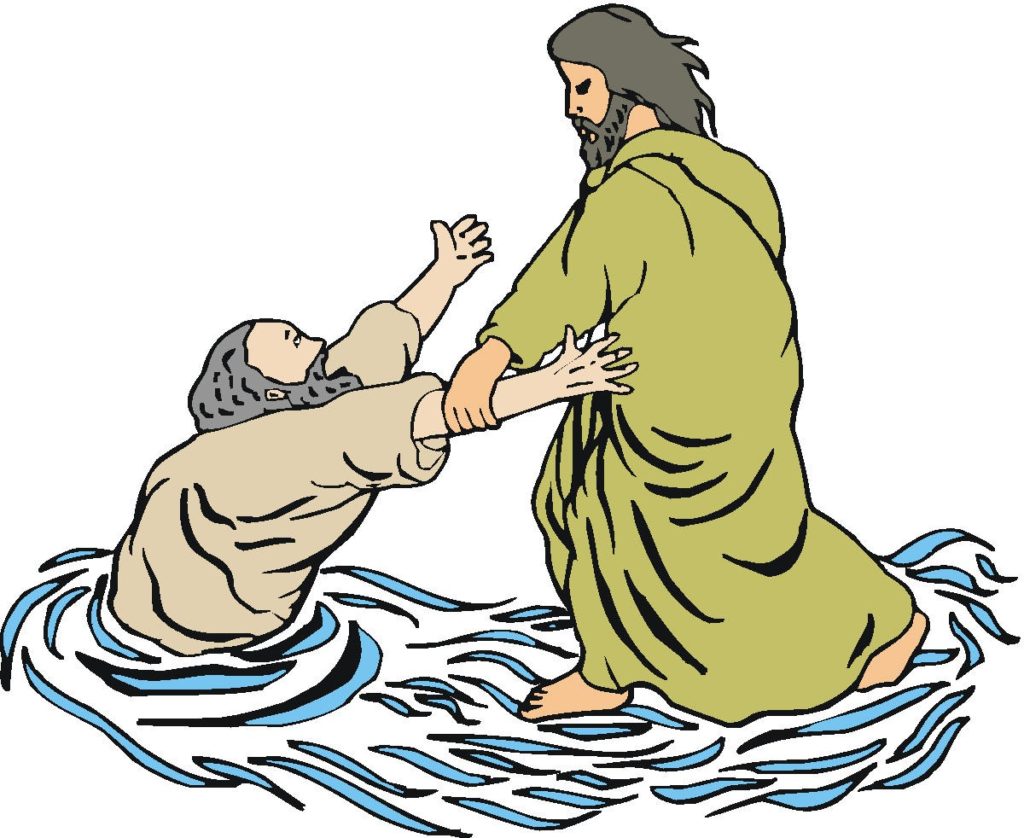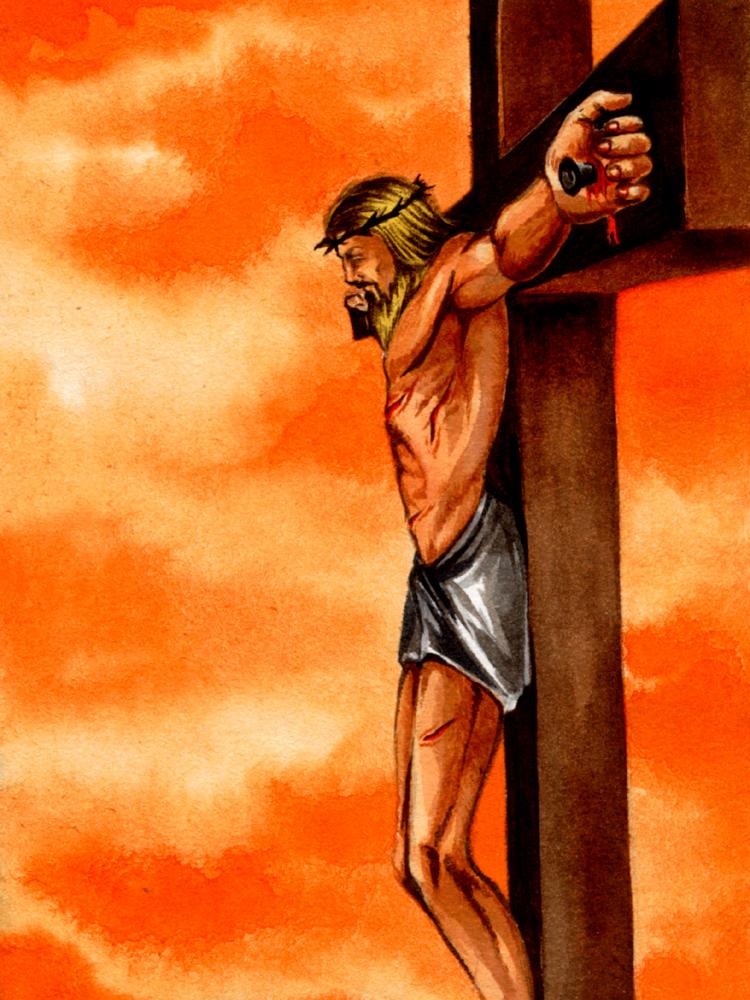
Numbers 5:11–31, The adulterous woman. This passages deals with a curious ritual involving wives suspected of adultery called the Law of Jealousies that seems to have nothing to do with anything relating to you and me. Yet, upon closer analysis, we see that it’s actually an amazing prophecy that relates to every redeemed believer who has ever lived and that Yeshua the Messiah is at the center of it.
In this ritual the woman is hauled before the priest, her head is uncovered and, according to Jewish tradition, her dress is ripped open just above her breasts (b.Talmud Sota 7a). She then has the choice to drink a concoction of earth from the floor of the tabernacle mixed with the set-apart (kadosh) water from the bronze laver into which is dipped a piece of paper that contains the curses written on it. If she is guilty of the charges of adultery when she drinks the bitter waters, her belly shall swell and her thigh (Heb. yarek or side or loins, which are the seat of procreative power) shall rot as a result of a divine judgment. If she is guiltless, the bitter waters will have no effect on her. If she refuses to drink the bitter water and her husband still suspects her unfaithfulness, then he is free to divorce her, even though she has admitted no guilt. According to Jewish tradition, this legal procedure was carried out by Israel’s highest court in Jerusalem (ibid. 7b).
Some biblical commentators see a parallel here between the adulterous woman and the trial and execution of Yeshua at the cross. On the surface, this explanation may seem improbable, but as we go on, we will see otherwise and much more besides.
As we begin to disambiguate the meaning of this curious ritual, consider this. We know that YHVH likened his relationship to Israel to a marriage (Ezek 16). However Israel (both houses) didn’t remain faithful to her (their) marriage covenants (Ezek chapters 16 and 23; Jer 3; the entire book of Hosea). Under the Torah, adultery was a capital offense (Lev 20:10). Of course, YHVH was faithful to his marriage covenants with Israel. He is not a sinner (i.e. a violator of his own Torah, 1 John 3:4). With whom was the fault then for the failure of the marriage? It was with the house of Israel and the house of Judah! (See Heb 8:7–8.) All of YHVH’s people have sinned (violated YHVH’s Torah) and fallen short of his glory (Rom 6:23), and the Scriptures are clear that the penalty or wages of sin is death (Rom 3:23 and Ezek 18:4).
“But I am a Gentile Christian, not an Israelite,” you may respond. “Neither I nor my ancestors was ever an Israelite who was spiritually married to YHVH. Therefore, I am not guilty of spiritual unfaithfulness. I have not broken any marriage covenants with YHVH.” In response, first, who did Yeshua come to redeem? He came to redeem the lost sheep of the house of Israel (Matt 15:24). Scripture likens all wayward sinners to the lost sheep who have gone astray (Isa 53:6). Moreover, Paul equated Gentile believers with the house of Israel (Rom 9:25–29 and compare with Hos 2:23; Isa 10:22–23).
Secondly, Jacob, the father of the twelve tribes of Israel, on his deathbed gave a curious prophesy concerning who the descendant of Ephraim and Manasseh would be (Genesis 48:14–16). In this scripture passage, Jacob speaks of a Messenger from heaven who had redeemed him from all evil, and he makes the sign of the Paleo-Hebrew letter tav over his grandsons, which is the sign of the cross.He then speaks of these descendants of his growing into a multitude in the midst of the earth, or becoming like fish in the sea of humanity (see the Orthodox Jewish ArtScroll Stone Edition Chumash/Tanach translation of this verse). Who are these descendants who have as their religious symbols the sign of the cross and the fish and speak of a Redeemer or Savior? Obviously only Christian-type people fit this description. Therefore, spiritually speaking, are you not that adulterous woman?
Thirdly, elsewhere in the Bible, Paul clearly states that ALL those who have put their trusting faith in Yeshua the Messiah are Israel and Abraham is their father (Rom 4:16; 9:8–11; Gal 3:7, 9, 14, 28, 29.)
Now that we have established that all believers in Yeshua are related to the descendants of Jacob and are thus Israelites (Paul call the saints “the Israel of Elohim,” Gal 6:16), let’s ask the next question. At the cross we know that Yeshua bore upon himself all of our sins (Isa 53:4–6). Did he also bear upon himself our guilt for committing spiritual adultery when in our ignorance we disobeyed the commandments of Elohim when we sinned by serving, worshipping and obeying other gods (e.g. self, money, pleasure, sex, education, power, approval of others, drugs)? Indeed! He died in our place by becoming like the adulterous woman that we were. Moreover, Scripture tells us that his trial and crucifixion were like his drinking a bitter cup (Matt 26:39, 42; John 18:11). Furthermore, Yeshua was hauled before the highest religious court in the land of Israel in Jerusalem to stand trial prior to his death (Matt 26:57–68). Like the adulterous woman on trial in Numbers 5, he was stripped of his garments (see Matt 27:31), and while on the cross, his side was ripped open by the Roman soldier’s spear (John 19:34). As a substitution for us, he took the curses that was against each of us for adultery that in times past would have been written down on paper (Num 5:23). With this in mind, Paul addresses this very thing in Colossians 2:12–15, with special emphasis on verse 14, where he states that Yeshua took the curses or penalties for our violating YHVH’s laws that were against us and paid each the sin-debt or penalty in full for each of us when he died on the cross. For those who are washed in Yeshua’s atoning and redeeming blood and have been buried with him in water immersion or baptism (Col 2:12 cp. Rom 6:3–11), the devil, like a prosecuting attorney, and who is the accuser of the brethren (Rev 12:10 cp. Job 1:6–12; 2:1–6), no longer has any charges to lay against us, since Yeshua paid in full the legal debt for our sins before courts of heaven (Col 2:15).
Few Bible students understand this glorious truth of how we are all like the adulterous woman, and how Yeshua took upon himself the charges that were laid against us because of our sins and paid the price in full when he died on the cross. The Scriptures predicted his horrific yet glorious event in the time of Moses down to the smallest detail some 1,500 years before it occurred. Give Elohim the glory!







